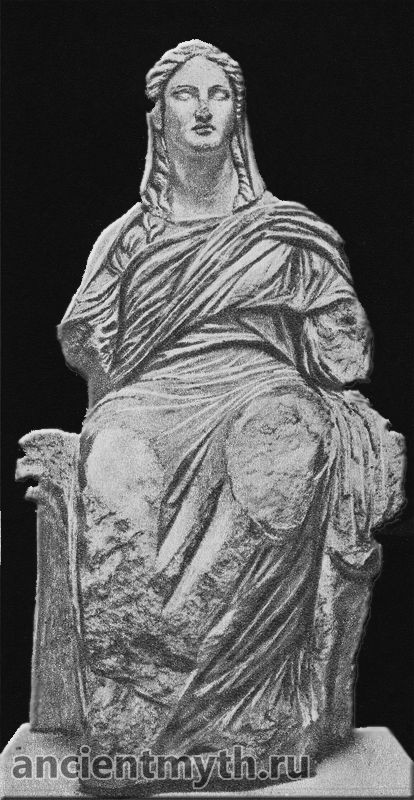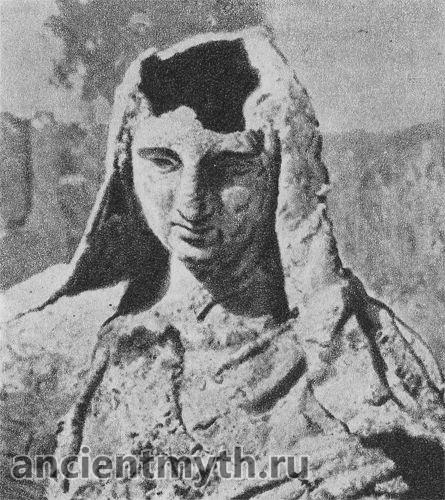The Abduction of Persephone by Hades
Powerful is the great goddess Demeter. It gives fertility to the earth, and without its beneficial power, nothing grows in shady forests, meadows, or fat arable land.

The great goddess Demeter had a beautiful young daughter Persephone. Persephone's father was the great son of Cronus himself, the thunderer Zeus. One day, the beautiful Persephone, along with her friends, the oceanids, carelessly frolicked in a blooming Nisei Valley. Like a light-winged butterfly, Demeter's young daughter ran from flower to flower. She plucked lush roses, fragrant violets, snow-white lilies and red hyacinths. Persephone frolicked carelessly, unaware of the fate that her father Zeus had appointed for her. Persephone did not think that it would be a long time before she would see the clear light of the sun again, not soon she would admire the flowers and inhale their sweet fragrance. Zeus gave her in marriage to his gloomy brother Hades, the ruler of the kingdom of the shadows of the dead, and Persephone had to live with him in the darkness of the underworld, deprived of light and the hot southern sun.

The goddess Demeter heard Persephone's cry. She hurried to the Nisei Valley, looking everywhere for her daughter; she asked for her friends, the oceanids, but she was nowhere to be found. The Oceanids did not see where Persephone had disappeared.
Heavy sorrow for the loss of her only beloved daughter took possession of Demeter's heart. Dressed in dark clothes, for nine days, without realizing anything, without thinking about anything, the great goddess Demeter wandered around the earth, shedding bitter tears. She looked everywhere for Persephone, asked everyone for help, but no one could help her in her grief. Finally, on the tenth day, she came to the god Helios-the Sun and began to pray to him with tears:- Oh, radiant Helios! You ride on a golden chariot high in the sky all the earth and all the seas, you see everything, nothing can hide from you; if you have even a little pity for the unfortunate mother, then tell me where my daughter Persephone is, tell me where to look for her! I heard her scream, she was abducted from me. Tell me who kidnapped her. I've been looking everywhere for her, but I can't find her anywhere!
The radiant Helios answered Demeter:
- Great goddess, you know how I honor you, you see how I grieve, seeing your grief. Know that the great cloud-runner Zeus gave your daughter in marriage to his gloomy brother, the lord Hades. He kidnapped Persephone and took her to his kingdom full of horrors. Overcome your heavy sorrow, goddess; after all, your daughter's husband is great, she became the wife of the mighty brother of the great Zeus.
The goddess Demeter was even more saddened. She was angry with the thunderer Zeus for giving Persephone to Hades as a wife without her consent. She left the gods, left the bright Olympus, took the form of a simple mortal and, dressed in dark clothes, wandered for a long time among mortals, shedding bitter tears.
All growth on earth has stopped. The leaves on the trees withered and flew off. The forests stood naked. The grass faded; the flowers dropped their variegated corollas and withered. There were no fruits in the gardens, green vineyards withered, heavy juicy bunches did not ripen in them. Before, the fertile fields were empty, not a blade of grass grew on them. Life on earth froze. Hunger reigned everywhere: crying and moaning were heard everywhere. Death threatened the entire human race. But Demeter did not see or hear anything, immersed in sadness for her dearly beloved daughter.
Finally Demeter came to the city of Eleusis. There, at the city walls, she sat down in the shade of an olive tree on the "stone of sorrow" at the very "well of virgins". Demeter sat motionless, like a statue. Her dark clothes fell in straight folds to the ground. Her head was bowed, and tears rolled from her eyes one after another and fell on her chest. Demeter sat there for a long time, alone, inconsolable.The daughters of King Eleusis saw her, Cell. They were surprised to notice a crying woman in dark clothes at the spring, approached her and asked with concern who she was. But the goddess Demeter did not reveal herself to them. She said that her name was Deo, that she was from Crete, that she had been taken away by robbers, but she fled from them and after long wanderings came to Eleusis. Demeter asked the daughters of Kelei to take her to their father's house, she agreed to become their mother's maid, raise children and work in Kelei's house. The daughters of Keleus brought Demeter to their mother, Metaneire.
The daughters of Kelei did not think that they were introducing a great goddess into their father's house. But when they brought Demeter into the father's house, the goddess touched the top of the door with her head, and the whole house lit up with a wonderful light. Metaneira stood up to meet the goddess, she realized that her daughters had not brought a mere mortal to her. Kelei's wife bowed low before the stranger and asked her to sit in her place as queen. Demeter refused; she silently sat down on a simple maid's seat, still indifferent to everything that was happening around her. The maid of Metaneira, cheerful Yamba, seeing the deep sadness of the stranger, tried to cheer her up. She served her and her mistress Metaneira merrily; her laughter was loud and jokes poured out. Demeter smiled for the first time since the gloomy Hades stole Persephone from her, and for the first time she agreed to eat food.
Demeter stayed with Kelei. She began to raise his son Demofont. The goddess decided to give Demophon immortality. She held the baby at her divine breast, on her lap; the baby breathed the immortal breath of the goddess. Demeter rubbed it with ambrosia, and at night, when everyone in the cell was asleep, she,wrapping Demofont in diapers, she put him in a brightly burning oven. But Demophon did not receive immortality. Once Metaneira saw her son lying in the oven, she was terribly frightened and began to beg Demeter not to do this. Demeter was angry at Metaneira, took Demofont out of the lech and said:
- Oh, unreasonable! I wanted to give immortality to your son. make him invulnerable. Know that I am Demeter, giving strength and joy to mortals and immortals.
Demeter opened the Cell to Metaneira, who she was, and assumed her usual image of a goddess. Divine light spread through the chambers of the Cell. The goddess Demeter stood, majestic and beautiful, golden hair fell on her shoulders, her eyes burned with divine wisdom, fragrance flowed from her clothes. Metaneira and her husband fell on their knees before her.
The goddess Demeter ordered to build a temple in Eleusis, at the source of Kallichora, and stayed to live in it. At this temple, Demeter herself established the festivities.
The sadness for her dearly beloved daughter did not leave Demeter, nor did she forget her anger at Zeus. The land was still barren. The famine was getting stronger, as not a single herb was growing in the farmers' fields. In vain the farmer's oxen dragged a heavy plow across the arable land - their work was fruitless. Whole tribes were dying. The cries of the hungry rushed to the sky, but Demeter did not listen to them. Finally, the sacrifices to the immortal gods stopped smoking on earth. Death threatened all living things. The great cloud-runner Zeus did not want the death of mortals. He sent a messenger of the gods to Demeter I will come. She quickly rushed on her rainbow wings to Eleusis to the temple of Demeter, called her, begged her to return to the bright Olympus to the host of the gods. Demeter did not heed her pleas. The great Zeus also sent other gods to Demeter, but the goddess did not want to return to Olympus before Hades returned her daughter Persephone to her.
Then the great Zeus sent to his gloomy brother Hades, as quick as thought, Hermes. Hermes descended into the kingdom of Hades full of horrors, appeared before the lord of the souls of the dead sitting on the golden throne and told him the will of Zeus.
Hades agreed to let Persephone go to her mother, but first gave her to swallow the grain of the pomegranate fruit, a symbol of marriage. Persephone ascended the golden chariot of her husband with Hermes; the immortal horses of Hades rushed, no obstacles were terrible to them, and in the blink of an eye they reached Eleusis. Forgetting everything for joy, Demeter rushed to meet her daughter and took her in her arms. Her beloved daughter Persephone was with her again. Demeter returned to Olympus with her. Then the great Zeus decided that he would live with Persephone's mother for two-thirds of the year, and return to his husband Hades for one-third. The Great Demeter restored fertility to the earth, and again everything bloomed, turned green. The forests were covered with tender spring foliage; flowers sparkled on the emerald ants of the meadows. Soon the cornfields began to flourish; the gardens bloomed and smelled sweet; the greenery of the vineyards sparkled in the sun. All nature awoke, All living things rejoiced and glorified the great goddess Demeter and her daughter Persephone. But every year Persephone leaves her mother, and every time Demeter plunges into sadness and again puts on dark clothes. And all nature grieves for the departed. The leaves turn yellow on the trees, and the autumn wind tears them off; the flowers fade, the fields empty, winter comes. Nature sleeps to wake up in the joyful splendor of spring when she returns to her mother from the joyless kingdom of Hades Persephone. When her daughter returns to Dimeter, then the great goddess of fertility lavishes her gifts to people with a generous hand and blesses the work of the farmer with a rich harvest.